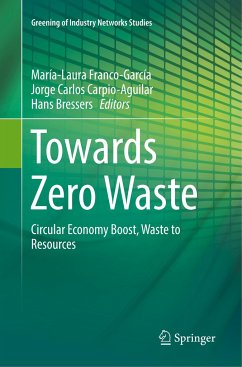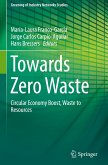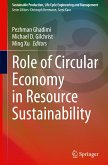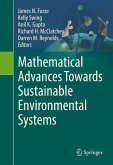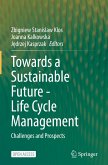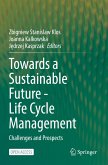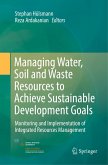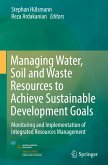Towards Zero Waste
Circular Economy Boost, Waste to Resources
Herausgegeben:Franco-García, María-Laura; Carpio-Aguilar, Jorge Carlos; Bressers, Hans
Towards Zero Waste
Circular Economy Boost, Waste to Resources
Herausgegeben:Franco-García, María-Laura; Carpio-Aguilar, Jorge Carlos; Bressers, Hans
- Broschiertes Buch
- Merkliste
- Auf die Merkliste
- Bewerten Bewerten
- Teilen
- Produkt teilen
- Produkterinnerung
- Produkterinnerung
This book draws on insights that originated from the Circular Economy and Zero Waste initiatives. Together these approaches try to boost the shift from "waste" to "resources" management. The content of this book is partially organized from a stakeholder perspective, revealing the managerial implications for public and private actors. Next to public policies, also illustrations come from the private sector. Petstar, Texperium and Walmart generously shared some of their best practices at in this regard.
Cases from China, Indonesia, Mexico, the Netherlands and Romania are discussed in this…mehr
Andere Kunden interessierten sich auch für
![Towards Zero Waste Towards Zero Waste]() Towards Zero Waste116,99 €
Towards Zero Waste116,99 €![Role of Circular Economy in Resource Sustainability Role of Circular Economy in Resource Sustainability]() Role of Circular Economy in Resource Sustainability116,99 €
Role of Circular Economy in Resource Sustainability116,99 €![Mathematical Advances Towards Sustainable Environmental Systems Mathematical Advances Towards Sustainable Environmental Systems]() Mathematical Advances Towards Sustainable Environmental Systems75,99 €
Mathematical Advances Towards Sustainable Environmental Systems75,99 €![Towards a Sustainable Future - Life Cycle Management Towards a Sustainable Future - Life Cycle Management]() Towards a Sustainable Future - Life Cycle Management39,99 €
Towards a Sustainable Future - Life Cycle Management39,99 €![Towards a Sustainable Future - Life Cycle Management Towards a Sustainable Future - Life Cycle Management]() Towards a Sustainable Future - Life Cycle Management31,99 €
Towards a Sustainable Future - Life Cycle Management31,99 €![Managing Water, Soil and Waste Resources to Achieve Sustainable Development Goals Managing Water, Soil and Waste Resources to Achieve Sustainable Development Goals]() Managing Water, Soil and Waste Resources to Achieve Sustainable Development Goals67,99 €
Managing Water, Soil and Waste Resources to Achieve Sustainable Development Goals67,99 €![Managing Water, Soil and Waste Resources to Achieve Sustainable Development Goals Managing Water, Soil and Waste Resources to Achieve Sustainable Development Goals]() Managing Water, Soil and Waste Resources to Achieve Sustainable Development Goals75,99 €
Managing Water, Soil and Waste Resources to Achieve Sustainable Development Goals75,99 €-
-
-
This book draws on insights that originated from the Circular Economy and Zero Waste initiatives. Together these approaches try to boost the shift from "waste" to "resources" management. The content of this book is partially organized from a stakeholder perspective, revealing the managerial implications for public and private actors. Next to public policies, also illustrations come from the private sector. Petstar, Texperium and Walmart generously shared some of their best practices at in this regard.
Cases from China, Indonesia, Mexico, the Netherlands and Romania are discussed in this book. In all of these different contexts they show ways to create collaborative schemes in order to "retain" the resources' values as much as product quality and financial circumstances permit.
The reader can thus take advantage of the pragmatic viewpoints that aim to inspire policy makers, researchers, students, organisations and communities to boost the needed changes towardsa Zero Waste Economy.
Cases from China, Indonesia, Mexico, the Netherlands and Romania are discussed in this book. In all of these different contexts they show ways to create collaborative schemes in order to "retain" the resources' values as much as product quality and financial circumstances permit.
The reader can thus take advantage of the pragmatic viewpoints that aim to inspire policy makers, researchers, students, organisations and communities to boost the needed changes towardsa Zero Waste Economy.
Produktdetails
- Produktdetails
- Greening of Industry Networks Studies 6
- Verlag: Springer / Springer International Publishing / Springer, Berlin
- Artikelnr. des Verlages: 978-3-030-06550-8
- Softcover reprint of the original 1st edition 2019
- Seitenzahl: 288
- Erscheinungstermin: 19. Januar 2019
- Englisch
- Abmessung: 235mm x 155mm x 15mm
- Gewicht: 538g
- ISBN-13: 9783030065508
- ISBN-10: 3030065502
- Artikelnr.: 57534627
- Herstellerkennzeichnung Die Herstellerinformationen sind derzeit nicht verfügbar.
- Greening of Industry Networks Studies 6
- Verlag: Springer / Springer International Publishing / Springer, Berlin
- Artikelnr. des Verlages: 978-3-030-06550-8
- Softcover reprint of the original 1st edition 2019
- Seitenzahl: 288
- Erscheinungstermin: 19. Januar 2019
- Englisch
- Abmessung: 235mm x 155mm x 15mm
- Gewicht: 538g
- ISBN-13: 9783030065508
- ISBN-10: 3030065502
- Artikelnr.: 57534627
- Herstellerkennzeichnung Die Herstellerinformationen sind derzeit nicht verfügbar.
Franco-García lectured and researched at "National Autonomous University of Mexico (UNAM)", "Metropolitan Autonomous University" and "Tecnológico de Monterrey". These represent some of the most recognised high educational institutions in Mexico. In 2003 she became director of the first Master's programme on "Sustainable Development Sciences" and she was head of the "Sustainable Development" department" at Tecnológico de Monterrey, Campus Mexico State, till 2006. She currently teaches in the Masters of Energy and Environmental Management (MEEM) and the programme (at bachelor level): "Crossing borders, international grand challenges and strategies for technology, sustainability and development". Franco-García is one of the European coordinators of the global network of "Greening of Industry Network (GIN)",GIN organizes conferences in three regions so far: Asia, America and Europa. The latest one (May 2017) was dedicated to topics associated to the SDG and Sustainable Supply Chains in the post-global economy. MSc. Jorge-Carlos Carpio Aguilar (1987), Professor of Climate Change & Energy Use at "Tecnológico de Monterrey" in Mexico and Sustainability Manager at Walmart Mexico & Central America. From his role in the private initiative, he has been leading sustainability projects along the supply chain, also considering the interaction with the public sector. He is currently responsible of the 2025 strategy for the zero landfill objective based on Circular Economy principles for Walmart Mexico. Jorge is also a technical expert and member of the Sustainability Committee of the Mexican Accreditation Entity (EMA). He holds an Industrial and Systems Engineer degree and a Master's of Science in Sustainable Development from "Tecnológico de Monterrey" in Mexico. Jorge also has experience in the mass consumer goods, recycling and packaging industries, where he was leading the development of a route map strategy to achieve sustainability goals for water, waste and emissions reduction for the same company in Mexico, Puerto Rico, Dominican Republic and Trinidad & Tobago. Mr. Carpio-Aguilar applied Life Cycle Assessment (LCA) tool to develop environmental, economic and quality indicators for a cardboard recycling policy. This investigation was a result of a research stay programme at the CSTM department of the University of Twente in The Netherlands. The programme had a focus on sustainability, waste management and best available practises for the industry. Mr. Carpio-Aguilar has experience on Environmental Management Systems, Environmental Regulatory Framework, Life Cycle Management, Carbon Footprint Lead Auditor, ISO9001 - ISO14001 and ISO 22000 Internal Auditor, GRI training program and Supply Chain Management. Co-organizer of the "4th International Symposium on Circular Economy: Inspiring Sustainable Innovation", in collaboration with "Tecnológico de Monterrey", EGADE, GIN and Unilever. Speaker in different international Symposiums and Congresses related to waste and water management, Life Cycle Assessment and Sustainability strategies. Prof.dr. Hans Th.A. Bressers (1953) is professor of Policy Studies and Environmental Policy at the University of Twente in the Netherlands and founder of the CSTM, the Department of Governance and Technology for Sustainability, one of the departments of the Faculty of Behavioural, Management and Social sciences. At the university level, he is the Chair of the Twente Water Centre, that bundles the over 150 water management researchers of all technical, natural science and policy oriented faculties of the University of Twente. Previously he has been, inter alia, vice-chairman of the official permanent Evaluation Committee of the Environmental Management Act, which advised the Minister regularly on the efficacy of Dutch environmental policy. He was also the chairman of the Advisory Committee to the Dutch Minister for the Environment for theimplementation of environmental policy by local government and has been chairman of the Dutch social science association for environmental and energy research, SWOME and until recently an independent scientific member of the Commission on Sustainable development of the Dutch Social-Economic Council (SER). Currently, he is at the Dutch national level member of the national Advisory Committee on Water, that was chaired by the Prince of Orange until April 2013 when he became king. His dissertation on the effectiveness of Dutch water quality management (1983) won the annual award for best Dutch Public Administration book. In over three hundred articles, chapters, and books and a similar number of reports, conference papers and presentations (both in Dutch and in English) he published on policy -evaluation, - instruments, -networks, and -implementation, mostly applied on environmental and sustainability oriented policies. He has been researcher and project leader of numerousexternally funded projects, including several projects funded by EU research frameworks, Dutch national science foundation, national priority research programmes, Dutch ministries, etcetera. As a PhD advisor, he has led 47 researchers to their graduation before 2017.
1.- TOWARDS ZERO WASTE, CIRCULAR ECONOMY BOOST: WASTE TO RESOURCES (Introduction).- A.- CIRCULAR ECONOMY AND ZERO WASTE .- 2. Potentials and challenges for a circular economy in Mexico (Hans Dieleman & Concepción Martínez).- 3. Solid waste management for circular economy. Challenges and opportunities in Romania - The case study of Iasi County 4. - Feasibility analysis of a Cap-and-Trade system in Mexico and implications to Circular Economy B.- ZERO WASTE AS A CIRCULAR ECONOMY PRACTICE: PUBLIC SECTOR.-5. Circularity of Wastes: Stakeholders Identity and Salience for Household Solid Waste Management in Cimahi City, West Java Province, Indonesia 6. The urban solid wastes management in Cuautlancingo, Puebla moving toward a circular economy .- 7. A massive urban symbiosis: A preliminary review of the Urban Mining Pilot Bases Initiative in China .- 8. Incorporating Circular Sustainability principles in DKI Jakarta: Lessons Learned from Dutch Business Schools Management .- C.- ZEROWASTE AS A CIRCULAR ECONOMY PRACTICE: PRIVATE SECTOR.- 9. Share, Optimize, Closed-Loop for food waste (SOL4FoodWaste): The case of Walmart- Mexico .- 10. PetStar PET bottle-to-bottle recycling system, a zero-waste circular economy business model.- 11. Social and Environmental Life Cycle Assessment (SELCA) method for circular product design: The textile global value chain as a showcase.- D.- ZERO WASTE AS A CIRCULAR ECONOMY PRACTICE: CIVIL SOCIETY INTEGRATION TO GOVERNMENTAL EFFORTS.- 12. A Circular model of residential composting in Mexico State.
1.- TOWARDS ZERO WASTE, CIRCULAR ECONOMY BOOST: WASTE TO RESOURCES (Introduction).- A.- CIRCULAR ECONOMY AND ZERO WASTE .- 2. Potentials and challenges for a circular economy in Mexico (Hans Dieleman & Concepción Martínez).- 3. Solid waste management for circular economy. Challenges and opportunities in Romania - The case study of Iasi County 4. - Feasibility analysis of a Cap-and-Trade system in Mexico and implications to Circular Economy B.- ZERO WASTE AS A CIRCULAR ECONOMY PRACTICE: PUBLIC SECTOR.-5. Circularity of Wastes: Stakeholders Identity and Salience for Household Solid Waste Management in Cimahi City, West Java Province, Indonesia 6. The urban solid wastes management in Cuautlancingo, Puebla moving toward a circular economy .- 7. A massive urban symbiosis: A preliminary review of the Urban Mining Pilot Bases Initiative in China .- 8. Incorporating Circular Sustainability principles in DKI Jakarta: Lessons Learned from Dutch Business Schools Management .- C.- ZEROWASTE AS A CIRCULAR ECONOMY PRACTICE: PRIVATE SECTOR.- 9. Share, Optimize, Closed-Loop for food waste (SOL4FoodWaste): The case of Walmart- Mexico .- 10. PetStar PET bottle-to-bottle recycling system, a zero-waste circular economy business model.- 11. Social and Environmental Life Cycle Assessment (SELCA) method for circular product design: The textile global value chain as a showcase.- D.- ZERO WASTE AS A CIRCULAR ECONOMY PRACTICE: CIVIL SOCIETY INTEGRATION TO GOVERNMENTAL EFFORTS.- 12. A Circular model of residential composting in Mexico State.

